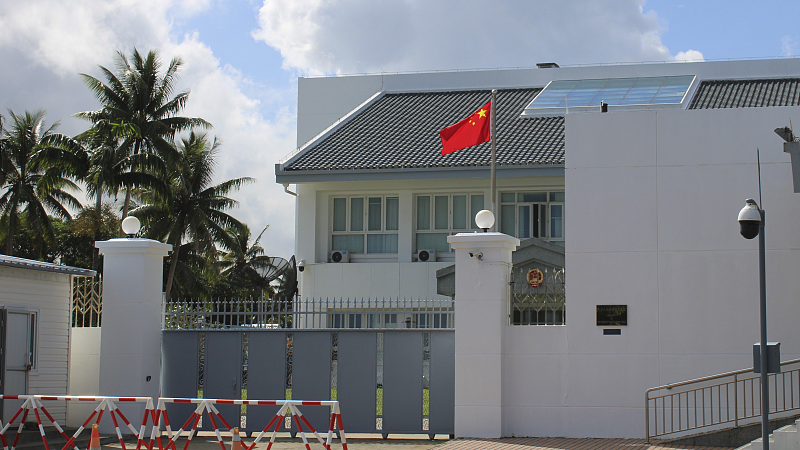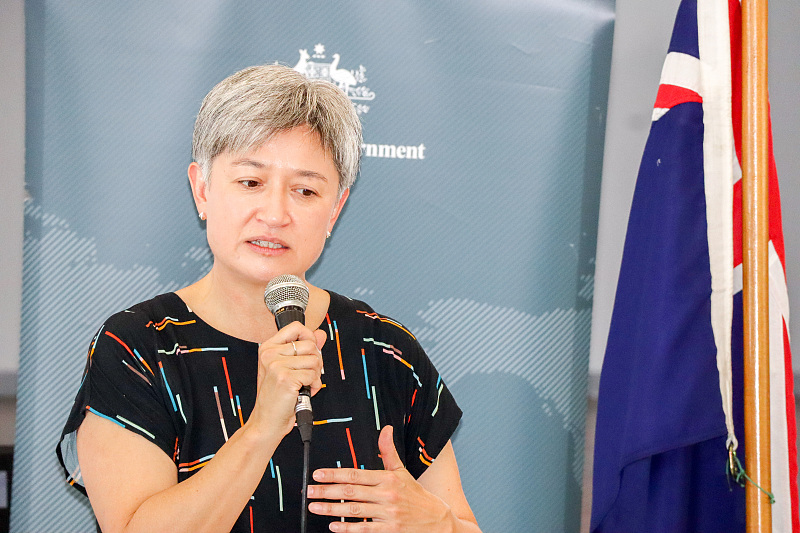
A barricade blocks the front of the Chinese Embassy in Suva, Fiji, May 27, 2022. /CFP
A barricade blocks the front of the Chinese Embassy in Suva, Fiji, May 27, 2022. /CFP
Editor's note: Daryl Guppy is an international financial technical analysis expert. He has provided weekly Shanghai Index analysis for Chinese mainland media for more than a decade. Guppy appears regularly on CNBC Asia and is known as "The Chart Man." He is a national board member of the Australia China Business Council. The article reflects the author's opinions and not necessarily the views of CGTN.
What a contrast in approach to international relations. On May 23, U.S.President Joe Biden presented the "Indo-Pacific Economic Framework for Prosperity." It was a take it or leave it proposal with no room for discussion or negotiation.
This week, Chinese Foreign Minister Wang Yi took a common development vision proposal to the second China-Pacific Island Countries Foreign Ministers meeting. This proposal was discussed by all participants acting on an equal basis. It was agreed after consultation that the proposal would be modified and discussed further. Wang said he welcomed the participation of other nations in the region, including Australia and New Zealand. This result is in the true spirit of global cooperation.
What a contrast to the approach by Western powers which often reject consultation.
Despite this cooperative approach, the Western reaction to Wang Yi's visits to the South Pacific is revealing. These reactions will be noted by Pacific Island leaders and will help shape future discussions with China and others active in the region.
"We put consensus first," said Fijian Prime Minister Frank Bainimarama. "Geopolitical point scoring means less than little to anyone whose community is slipping beneath the rising seas, whose job has been lost to a pandemic."
However, it seems that some wish to pursue a new cold war between China and the West in the Pacific. Some reactions by Western governments and commentators reveal that their concept of a free and open Pacific applies only to the ex-colonial powers of America, Britain, France and Australia.
Fergus Hanson, a director at the Australian Strategic Policy Institute, suggested creating a new regional security treaty that explicitly bans non-resident powers from basing or deploying military personnel in the Pacific region. This would allow powers already present – such as the U.S.– to stay, but the region would be off-limits for new military entrants.
This commentary may say more about the U.S. approach to the Pacific than it does about the new Australian government approach, but it is too early to tell. However, these comments and President Biden's recent proposal in Japan, also reveal a lack of interest in multilateral solutions.
Chinese President Xi Jinping provided comprehensive support for the Global Development Initiative (GDI). Foreign Minister Wang Yi's visit to the Pacific is consistent with achieving the GDI objectives.
Australia seems particularly concerned about China's offer to assist with police training for Pacific Island police forces, apparently because this may be different from the Australian approach to policing. This reveals a double standard in the Australian approach to police activity in the region.

Australian Foreign Minister Penny Wong speaks to a group of people who will be leaving Fiji to work in Australia under the Pacific Australian Labor Mobility (PALM) Scheme in Suva, Fiji, May 27, 2022. /CFP
Australian Foreign Minister Penny Wong speaks to a group of people who will be leaving Fiji to work in Australia under the Pacific Australian Labor Mobility (PALM) Scheme in Suva, Fiji, May 27, 2022. /CFP
Australia is also concerned about Wang Yi's visit to Timor-Leste and there is some concern that this is intruding on Australia's interests. This conveniently forgets the role Australia played in the illegal bugging of the Timor-Leste embassy to eavesdrop on confidential discussions in relation to the oil reserves in the Timor Sea. Rather than show contrition for this wrong doing, the Australian government spent years in secretive trials to punish those who exposed this operation.
Whilst Western countries involved in the Pacific like to think of themselves as paragons of benevolence in the region, there are significant events on the record that show this is not the case. This includes the French and American nuclear tests that displaced hundreds of islanders with little or no compensation.
For Australia it includes paying Nauru to take refugees bound for Australia, constructing a naval base on Manus Island against the wishes of the island population, bugging the phone of the wife of former Indonesian President Susilo Bambang Yudhoyono, bribing officials to use Australian banknote technology and using State-supported buyouts of Digicel to exclude Chinese companies from commercial business.
The Western approach to the needs of the Pacific carries a large historical trust deficit. It appears that after a decade of neglect that Australia's new Foreign Minister is serious about addressing the trust deficit. This can be accelerated by accepting Wang Yi's offer of inclusion and cooperation.
(If you want to contribute and have specific expertise, please contact us at opinions@cgtn.com. Follow @thouse_opinions on Twitter to discover the latest commentaries on CGTN Opinion Section.)

